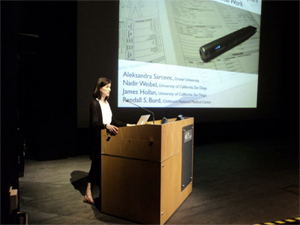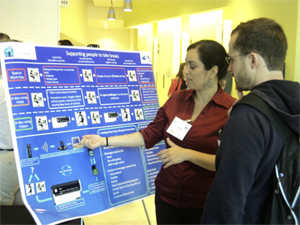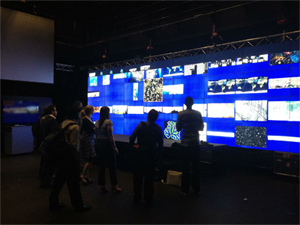PervasiveHealth Conference Explores Ubiquitous Computing in Health Care and Well-being
By:
Published Date
Article Content

Dr. Aleksandra Sarcevic of Drexel University presents an innovative digital pen interface for information capture and display in time-critical medical work, developed in collaboration with Drs. Nadir Weibel and Jim Hollan from the UCSD Department of Cognitive Science, and Dr. Randall Burd from the Children's National Medical Center in Washington D.C.
In late May the California Institute for Telecommunications and Information Technology (Calit2) hosted PervasiveHealth -- the 6th International Conference on Pervasive Computing Technologies for Healthcare.
PervasiveHealth is a premier international forum with specific focus on technologies and human factors related to the use of ubiquitous computing in healthcare and wellbeing.
For the first time in its young history, PervasiveHealth was held outside Europe. The local chair, UC San Diego's Dr. Nadir Weibel, organized the conference with support from the Calit2-based Center for Wireless and Population Health Systems (CWPHS), and its director, UC San Diego School of Medicine professor of preventive and emergency medicine, Dr. Kevin Patrick.
PervasiveHealth is a premier international forum with specific focus on technologies and human factors related to the use of ubiquitous computing in healthcare and wellbeing.
The conference successfully brought together researchers, practitioners, application developers, and end users from all over the world to San Diego to experience, present, share and discuss the latest findings in pervasive healthcare research.

UCSD's Laura Pina presents her poster on "Fitbit+: A Behavior-based Intervention System to Reduce Sedentary Behavior."
Almost 100 attendees from 18 countries and 4 continents gathered together at Calit2 to attend the conference's three workshops, 18 oral presentations, 19 posters, and technology demonstrations.
The international conference's technical program committee was also an international affair. It was coordinated by general chair Rosa Arriaga from Georgia Tech, and directed by Monica Tentori from CICESE in Ensenada (Baja California), Alex Mihailidis from the University of Toronto, and Jakob Bardram from ITU University in Copenhagen.
Calit2 provided tours of its visualization facilities and technology demonstrations. According to Dr. Weibel, "the demonstrations opened up new perspectives on data visualization for pervasive healthcare technology."
The technical program kicked of with a keynote by Deborah Estrin from UCLA. The computer scientist told attendees that current sensor technology can produce personal data streams that, in turn, can be processed to create detailed, geocoded, time-stamped, activity logs of everyday lives. When combined with the wealth of available spatial data and models these activity traces can be used to make strong inferences. "We have the opportunity to learn from our own traces, and at the same time feed back data to clinicians to inform clinical care," said Estrin.

PervasiveHealth participants tour Calit2 visualization facilities including the Vroom large-scale viz display.
The conference covered general themes ranging from wellness and wellbeing, to physical activities and self-monitoring, healthcare interdisciplinary design and user needs, tools and infrastructures for pervasive healthcare, and activity recognition.
The Best Paper award at PervasiveHealth went to Thomas Frenken, Andreas Hein and their collaborators from Germany's OFFIS Institute for Information Technology. The paper, "Novel Approach to Unsupervised Mobility Assessment Tests: Field Trial For aTUG," outlined an innovative approach to unsupervised mobility assessment.
Researchers from UC San Diego presented work on novel paper-digital interfaces for time-critical medical work, effective interventions to reduce sedentary behavior, and mobile air-quality sensing. Researchers from UC Irvine -- UC San Diego's partner in Calit2 -- presented a study on mobile health informatics for preterm infants.
PervasiveHealth is endorsed and organized by the European Alliance for Innovation (EAI) and CREATE-NET in Trento (Italy), and sponsored by ICST, the Institute for Computer Sciences, Social Informatics and Telecommunications Engineering located in Belgium.
PervasiveHealth 2013 will be held in Venice, Italy, from May 5-8. For more information on the conference, contact Dr. Nadir Weibel at weibel@ucsd.edu.
Share This:
You May Also Like
Stay in the Know
Keep up with all the latest from UC San Diego. Subscribe to the newsletter today.



